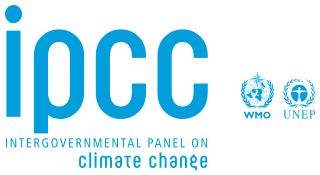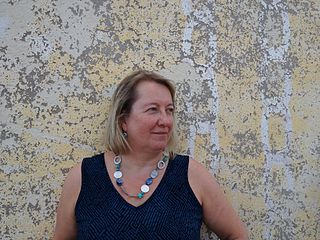Related Research Articles

Efforts to scientifically ascertain and attribute mechanisms responsible for recent global warming and related climate changes on Earth have found that the main driver is elevated levels of greenhouse gases produced by human activities, with natural forces adding variability. The likely range of human-induced surface-level air warming by 2010–2019 compared to levels in 1850–1900 is 0.8 °C to 1.3 °C, with a best estimate of 1.07 °C. This is close to the observed overall warming during that time of 0.9 °C to 1.2 °C, while temperature changes during that time were likely only ±0.1 °C due to natural forcings and ±0.2 °C due to variability in the climate.

The global warming controversy concerns the public debate over whether global warming is occurring, how much has occurred in modern times, what has caused it, what its effects will be, whether any action can or should be taken to curb it, and if so what that action should be. In the scientific literature, there is a strong consensus that global surface temperatures have increased in recent decades and that the trend is caused by human-induced emissions of greenhouse gases. No scientific body of national or international standing disagrees with this view, though a few organizations with members in extractive industries hold non-committal positions, and some have attempted to convince the public that climate change is not happening, or if the climate is changing it is not because of human influence, attempting to sow doubt in the scientific consensus.

The Intergovernmental Panel on Climate Change (IPCC) is an intergovernmental body of the United Nations. Its job is to advance scientific knowledge about climate change caused by human activities. The World Meteorological Organization (WMO) and the United Nations Environment Programme (UNEP) established the IPCC in 1988. The United Nations endorsed the creation of the IPCC later that year. It has a secretariat in Geneva, Switzerland, hosted by the WMO. It has 195 member states who govern the IPCC. The member states elect a bureau of scientists to serve through an assessment cycle. A cycle is usually six to seven years. The bureau selects experts to prepare IPCC reports. It draws the experts from nominations by governments and observer organisations. The IPCC has three working groups and a task force, which carry out its scientific work.

Fudan University is a national public research university in Shanghai, China. Fudan is a member of the C9 League, Project 985, Project 211, and the Double First Class University identified by the Ministry of Education of China. It is also a member of Universitas 21, Washington University's McDonnell International Scholars Academy, and the Association of Pacific Rim Universities, BRICS Universities League, Association of East Asian Research Universities, and Council on Business & Society.

East China Normal University (ECNU) is a comprehensive public research university in Shanghai, China. It was formed in 1951 by the merger of the Great China University and Kwang Hua University and originated from the St. John's College founded in 1879. Established as a normal school, it had an original mission to train teachers for secondary and higher education, but soon housed top-class researchers and developed into an elite research-intensive university.

Patrick J. Michaels was an American agricultural climatologist. Michaels was a senior fellow in environmental studies at the Cato Institute until 2019. Until 2007, he was research professor of environmental sciences at the University of Virginia, where he had worked from 1980.
Sallie Louise Baliunas is a retired astrophysicist. She formerly worked at the Center for Astrophysics | Harvard & Smithsonian and was the Deputy Director of the Mount Wilson Observatory from 1991 to 2003.

The effects of climate change impact the physical environment, ecosystems and human societies. The environmental effects of climate change are broad and far-reaching. They affect the water cycle, oceans, sea and land ice (glaciers), sea level, as well as weather and climate extreme events. The changes in climate are not uniform across the Earth. In particular, most land areas have warmed faster than most ocean areas, and the Arctic is warming faster than most other regions. The regional changes vary: at high latitudes it is the average temperature that is increasing, while for the oceans and tropics it is in particular the rainfall and the water cycle where changes are observed. The magnitude of future impacts of climate change can be reduced by climate change mitigation and adaptation.
Myles Robert Allen is an English climate scientist. He is Professor of Geosystem Science in the University of Oxford's School of Geography and the Environment, and in the Atmospheric, Oceanic and Planetary Physics Department.

The economics of climate change concerns the economic aspects of climate change; this can inform policies that governments might consider in response. A number of factors make this and the politics of climate change a difficult problem: it is a long-term, intergenerational problem; benefits and costs are distributed unequally both within and across countries; and both the scientific consensus and public opinion on climate change need to be taken into account.

The American Association of Geographers (AAG) is a non-profit scientific and educational society aimed at advancing the understanding, study, and importance of geography and related fields. Its headquarters is located in Washington, D.C. The organization was founded on December 29, 1904, in Philadelphia, as the Association of American Geographers, with the American Society of Professional Geographers later amalgamating into it in December 1948 in Madison, Wisconsin. As of 2020, the association has more than 10,000 members, from nearly 100 countries. AAG members are geographers and related professionals who work in the public, private, and academic sectors.

In common usage, climate change describes global warming—the ongoing increase in global average temperature—and its effects on Earth's climate system. Climate change in a broader sense also includes previous long-term changes to Earth's climate. The current rise in global average temperature is more rapid than previous changes, and is primarily caused by humans burning fossil fuels. Fossil fuel use, deforestation, and some agricultural and industrial practices increase greenhouse gases, notably carbon dioxide and methane. Greenhouse gases absorb some of the heat that the Earth radiates after it warms from sunlight. Larger amounts of these gases trap more heat in Earth's lower atmosphere, causing global warming.
Friends of Science(FoS) is a non-profit advocacy organization based in Calgary, Alberta, Canada. The organization rejects the established scientific consensus that humans are largely responsible for the currently observed global warming. Rather, they propose that "the Sun is the main direct and indirect driver of climate change," not human activity. They argued against the Kyoto Protocol. The society was founded in 2002 and launched its website in October of that year. They are largely funded by the fossil fuel industry.
Cindi Katz, a geographer, is Professor in Environmental Psychology, Earth and Environmental Sciences, American Studies, and Women's Studies at the CUNY Graduate Center. Her work concerns social reproduction and the production of space, place and nature; children and the environment; the consequences of global economic restructuring for everyday life; the privatization of the public environment, the intertwining of memory and history in the geographical imagination, and the intertwined spatialities of homeland and home-based security. She is known for her work on social reproduction and everyday life, research on children's geographies, her intervention on "minor theory", and the notion of counter-topography, which is a means of recognizing the historical and geographical specificities of particular places while inferring their analytic connections to specific material social practices.

Diana Liverman is Regents Professor of Geography and Development and past Director of the University of Arizona School of Geography, Development and Environment in the College of Social and Behavioral Sciences in Tucson, Arizona.

The contributions of women in climate change have received increasing attention in the early 21st century. Feedback from women and the issues faced by women have been described as "imperative" by the United Nations and "critical" by the Population Reference Bureau. A report by the World Health Organization concluded that incorporating gender-based analysis would "provide more effective climate change mitigation and adaptation."
Janice Jones Monk is an Australian-American feminist geographer and researcher in the South West United States, and an Emeritus Professor at the University of Arizona School of Geography, Development and Environment.

Stefano Bloch is an American author and professor of cultural geography and critical criminology at the University of Arizona.

The Sixth Assessment Report (AR6) of the United Nations (UN) Intergovernmental Panel on Climate Change (IPCC) is the sixth in a series of reports which assess scientific, technical, and socio-economic information concerning climate change. Three Working Groups have been working on the following topics: The Physical Science Basis (WGI); Impacts, Adaptation and Vulnerability (WGII); Mitigation of Climate Change (WGIII). Of these, the first study was published in 2021, the second report February 2022, and the third in April 2022. The final synthesis report is due to be finished by early 2023.
Sallie A. Marston is an American social geographer and Regents Professor in the University of Arizona School of Geography, Development and Environment located in Tucson, Arizona.
References
- ↑ "Graduate Overview". geography.arizona.edu. December 18, 2019. Retrieved July 14, 2022.
- ↑ "About the School". November 26, 2019. Retrieved July 14, 2022.
- ↑ "UArizona Social Science Programs Excel in Recent Shanghai Rankings". July 27, 2022.
- ↑ "ShanghaiRanking's Global Ranking of Academic Subjects".
- ↑ "Native Americans' farming practices may help feed a warming world". The Washington Post . Retrieved July 15, 2022.
- ↑ "Drier Warning: University of Arizona Scientists Contribute to New International Climate Report" . Retrieved July 15, 2022.
- ↑ "Home". aag.org.
- ↑ "Janice Monk". October 14, 2019.
- ↑ "Diana Liverman". June 11, 2019.
- ↑ "Stefano Bloch". June 11, 2019.
- ↑ "Sallie Marston". June 11, 2019.
- ↑ "Departmental Faculty". June 24, 2019.